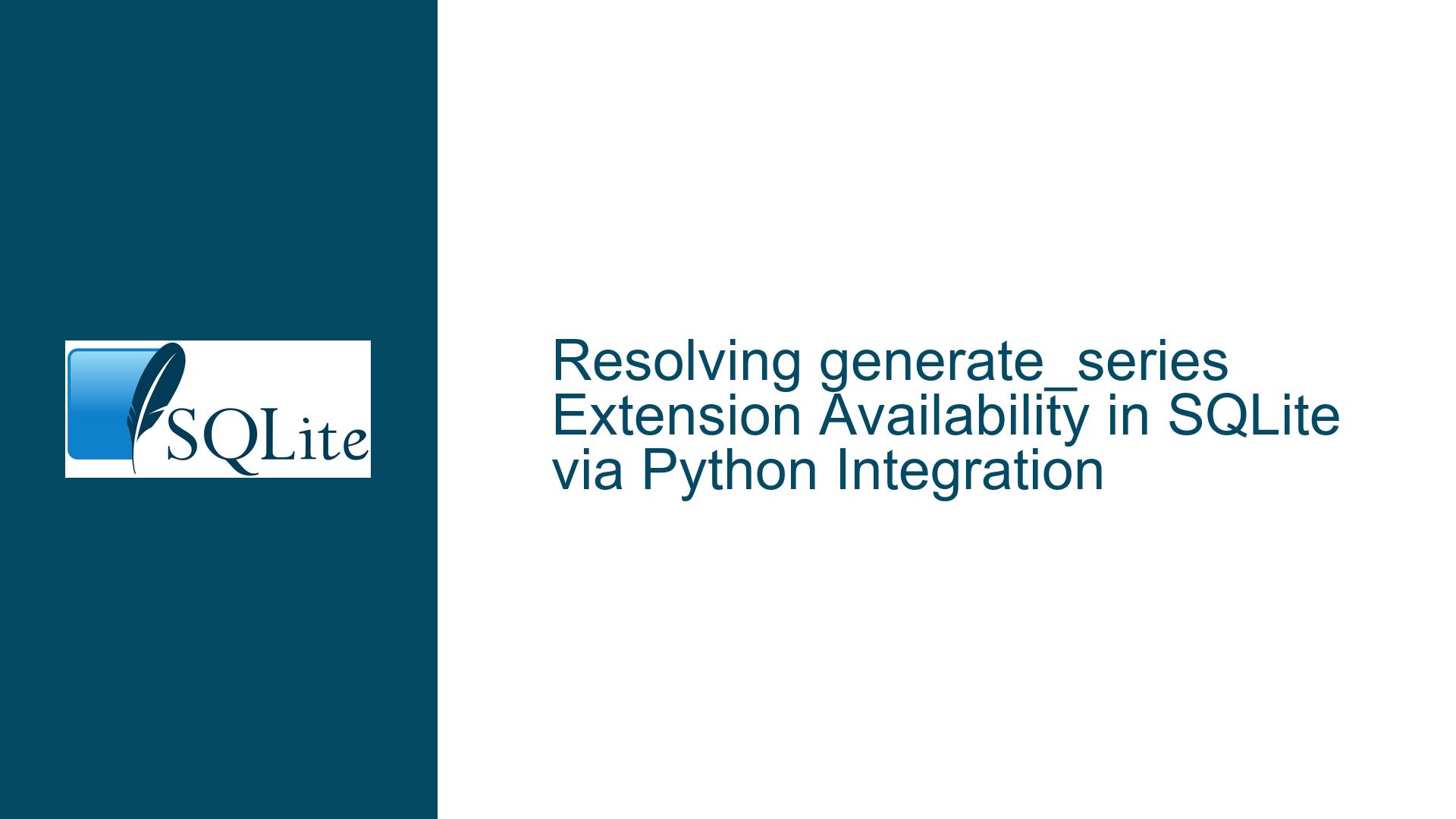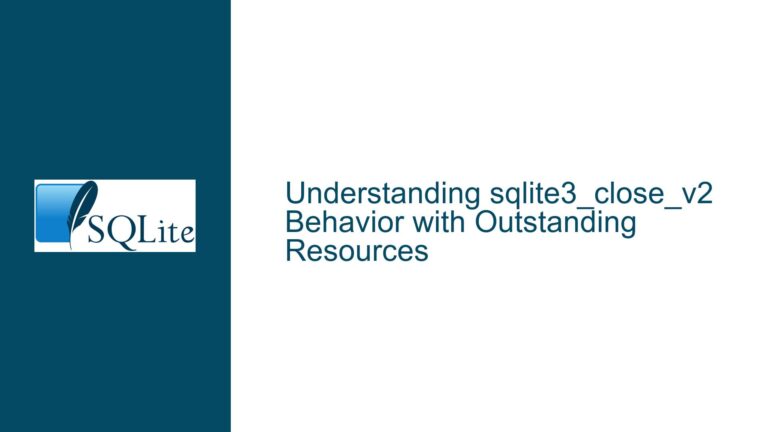Resolving generate_series Extension Availability in SQLite via Python Integration
SQLite generate_series Extension Compatibility in Python Environments
Understanding the generate_series Function Availability in Embedded SQLite
The core challenge revolves around accessing SQLite’s generate_series table-valued function when interfacing with SQLite via Python’s sqlite3 module. While this function operates seamlessly in the standalone SQLite Command-Line Interface (CLI), it raises an OperationalError: no such table exception when invoked through Python. This discrepancy stems from differences in how SQLite extensions are integrated across deployment scenarios. The SQLite CLI includes generate_series as a statically compiled extension, whereas standard SQLite distributions (including those bundled with Python) exclude it by default. Attempts to manually replace the SQLite dynamic link library (DLL) in Python’s environment may lead to secondary issues such as import failures due to binary incompatibilities or misconfigured extension initialization.
Root Causes of generate_series Unavailability and DLL Import Failures
1. Extension Compilation Model Differences
SQLite extensions like generate_series exist as optional modules that are not included in standard library builds. The SQLite CLI is compiled with these extensions embedded, but precompiled SQLite binaries (including those used by Python distributions) exclude them to minimize footprint. Python’s sqlite3 module dynamically links against a SQLite library that lacks these extensions unless explicitly included during compilation.
2. Static vs. Dynamic Linking Challenges
When users replace the default sqlite3.dll in Python’s environment with a custom build containing generate_series, they may encounter "DLL load failed" errors due to mismatched Application Binary Interfaces (ABIs). Python’s _sqlite3 C extension module binds to specific SQLite API symbols during its own compilation. If the replacement DLL was built with conflicting compiler flags (e.g., thread safety settings, optimization levels), symbol resolution fails, preventing Python from initializing the sqlite3 module entirely.
3. Extension Initialization Requirements
Statically embedding extensions like generate_series requires invoking SQLite’s sqlite3_auto_extension() API during library initialization to register the extension’s entry point. Merely compiling the extension’s source code (series.c) with the SQLite amalgamation is insufficient without explicit registration. This oversight leaves the extension present in the binary but non-functional, perpetuating the "no such table" error.
Comprehensive Solutions for Extension Integration and Python Compatibility
Static Compilation of generate_series with SQLite
To permanently include generate_series in SQLite’s core functionality for Python:
Source Code Preparation
- Obtain the SQLite amalgamation source (
sqlite3.c,sqlite3.h) and theseries.cextension source from SQLite’s repository. - Modify
series.cto include an initialization callback function. Append the following toseries.c:#ifdef SQLITE_CORE #include "sqlite3.h" int sqlite3_series_init(sqlite3 *db, char **pzErrMsg, const sqlite3_api_routines *pApi); #endif
- Obtain the SQLite amalgamation source (
Compiler Invocation with Registration Hooks
- Compile SQLite with the extension and auto-registration flags. For MSVC on Windows:
cl /DSQLITE_CORE /DSQLITE_ENABLE_SERIES sqlite3.c series.c /link /DLL /OUT:sqlite3.dll - The
/DSQLITE_ENABLE_SERIESdefine triggers a macro insqlite3.cthat callssqlite3_auto_extension()forgenerate_seriesduring library initialization.
- Compile SQLite with the extension and auto-registration flags. For MSVC on Windows:
Python Environment Integration
- Replace the original
sqlite3.dllin Python’sDLLsdirectory with the newly built version. - Validate using:
import sqlite3 conn = sqlite3.connect(':memory:') conn.execute("SELECT value FROM generate_series(1,5)").fetchall() - Critical Note: If Python was compiled with a different runtime library (e.g., Visual Studio 2019 vs. 2015), the custom DLL must use the same runtime to prevent ABI mismatches. Use
dumpbin /DEPENDENTS sqlite3.dllto verify runtime dependencies.
- Replace the original
Dynamic Extension Loading in Python
If static compilation proves infeasible due to environment constraints, load generate_series at runtime:
Build the Extension as a Loadable Module
- Compile
series.cinto a standalone DLL compatible with SQLite’s loadable extension format:cl /I. series.c /link /DLL /OUT:series.dll /DSQLITE_CORE - Place
series.dllin a directory accessible to the Python process.
- Compile
Enable Extension Loading in Python
- Modify the Python code to load the extension dynamically:
import sqlite3 conn = sqlite3.connect(':memory:') conn.enable_load_extension(True) conn.load_extension('series.dll') # Path may require adjustment conn.execute("SELECT value FROM generate_series(1,5)").fetchall() - Security Note: Dynamic loading requires trust in the extension’s origin, as malicious code could execute with the process’s privileges.
- Modify the Python code to load the extension dynamically:
Resolving DLL Import Errors in Python
If replacing sqlite3.dll causes ImportError: DLL load failed:
ABI Compatibility Verification
- Ensure the custom SQLite DLL and Python’s
_sqlite3.pyd(found inDLLs/_sqlite3.pyd) were compiled with identical compiler versions and settings. Usedumpbin /HEADERS sqlite3.dllanddumpbin /HEADERS _sqlite3.pydto compare runtime requirements.
- Ensure the custom SQLite DLL and Python’s
Rebuilding Python’s sqlite3 Module
- Recompile Python from source, linking against the custom SQLite DLL. This guarantees ABI alignment but requires substantial setup (e.g., installing Python’s build dependencies).
Fallback to Precompiled Binaries
- Use third-party Python distributions like Anaconda, which may include SQLite with
generate_seriespre-enabled, avoiding manual DLL replacement.
- Use third-party Python distributions like Anaconda, which may include SQLite with
Alternative Approaches for generate_series Functionality
If extension integration remains problematic, emulate generate_series using pure SQL or Python:
Recursive Common Table Expressions (CTEs)
WITH RECURSIVE generate_series(value) AS ( SELECT 1 UNION ALL SELECT value+1 FROM generate_series WHERE value+1 <= 5 ) SELECT value FROM generate_series;This mimics
generate_series(1,5)without requiring the extension.Python-Based Data Generation
Generate the series in Python and inject it into queries using parameter substitution:series = list(range(1, 6)) conn.executemany("INSERT INTO t VALUES (?)", [(x,) for x in series])
Final Considerations for Production Environments
Statically compiling extensions offers performance benefits but complicates dependency management. Dynamic loading provides flexibility but introduces runtime overhead and security considerations. Evaluate these trade-offs against project requirements. For mission-critical systems requiring generate_series, consider deploying a custom Python build with validated SQLite extensions to ensure stability across updates.






